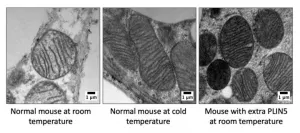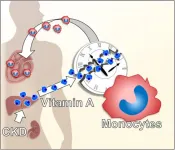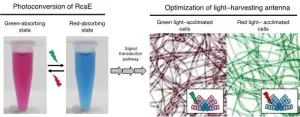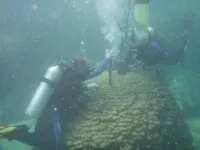What we know about water may have just changed dramatically
New research points to a potentially strong impact from water purification to drug manufacturing
2021-06-04
(Press-News.org) Water is weird - and yet so important. In fact, it is one of the most unusual molecules on Earth. It boils at a temperature it shouldn't. It expands and floats when it is in the solid-state. Its surface tension is higher than it should be. Now, new research published in the journal Nature has added one other equally strange property to water's list of oddities. The implications of this new revelation could have a remarkable impact on all water-related processes from water purification to drug manufacturing.
Stephen Cronin, professor of electrical and computer engineering at USC Viterbi School of Engineering, and Alexander Benderskii, associate professor of chemistry at the USC Dornsife College of Letters, Arts and Sciences, have showed that when water comes into contact with an electrode surface all its molecules do not respond in the same way. This can dramatically affect how well various substances can dissolve in water subject to an electrical field, which in turn, can determine how a chemical reaction will occur. And chemical reactions are a necessary component in how we make...everything.
It's appropriate that this groundbreaking work should come from interdisciplinary research between a chemist and an electrical engineer. After all, chemistry is fundamentally a study of electrons, and chemical reactions are what make the materials our modern world is built on. Each researcher provided an important component to the work. In this case, a groundbreaking electrode from the engineer, Cronin, and an advanced laser spectroscopy technique from the chemist, Benderskii. Ultimately, it was the combination of these two designs that led to the breakthrough observed.
First, Cronin designed a unique electrode built from monolayer graphene (just 0.355nm thick). Building graphene electrodes in and of itself is a very complex process. In fact, the electrode needed for this particular research is one that research groups across the globe have tried and failed to do in the past. "Alex and I had been struggling a while to achieve this and we had to change our design many times. It's rewarding and exciting to finally see the results of our work," Cronin said.
Once the electrode is placed on a cell of water and begins running a current, Benderskii's technique comes into play. He uses a special laser spectroscopy method that only a handful of other research groups have been capable to reproduce. "Using our approach to observe water molecules for the first time under the conditions of our experiments, we were able to see how the molecules interacted with the field in a way no one had previously understood," Benderskii said.
What the two found was that the top layer of water molecules closest to the electrode align in a completely different way than the rest of the water molecules. This realization was unexpected. But it can open the way to run more accurate simulations of how aqueous chemical reactions in various fields affect the materials they work with. One particular area where this research could have an immediate impact is providing clean water. "Water in contact with graphene is indeed being proposed as a new technology in de-salinization," Cronin said. "Our research could help scientists design better simulations that will ultimately bring to people desalinated clean water faster, cheaper, and cleaner."
Benderskii and Cronin don't plan on ending their long-standing research collaboration anytime soon. Now that they have identified this new quality of water, they plan to dig deeper. "Our published research is about how water collectively responds to a current. Next, we are trying to understand how this response works at an individual molecular level," Benderskii said.
INFORMATION:
ELSE PRESS RELEASES FROM THIS DATE:
2021-06-04
Cancer researchers say they have established a new, life-extending treatment option for men with prostate cancer that has spread and become resistant to hormone therapy. The injected treatment combines a targeting compound with a radioactive isotope to irradiate and kill cancer cells.
An international clinical trial sponsored by Endocyte, Inc., a Novartis company tested the targeted radioligand therapy in study participants with advanced prostate cancer. All subjects had cancers that had spread to other organs and continued to progress after previous treatment with two kinds of drugs, androgen axis inhibitors and taxanes. The experimental treatment significantly extended survival, delayed ...
2021-06-04
Leesburg, VA, June 4, 2021--According to a pilot study published in ARRS' American Journal of Roentgenology (AJR), the flexed elbow valgus external rotation (FEVER) view can improve MRI evaluation of the ulnar collateral ligament (UCL) in Major League Baseball (MLB) pitchers.
"The increased joint space width confirms elbow valgus stress with FEVER view," wrote corresponding author Thomas Knoblauch at the University of Nevada Las Vegas. "Diagnostic confidence increased, and additional UCLs were identified as abnormal."
Due to repetitive extreme valgus stress during overhead throwing maneuvers, UCL injuries remain common in throwing athletes. Because standard positioning for elbow MRI ...
2021-06-04
DALLAS - June 4, 2021 - Increasing a protein concentrated in brown fat appears to lower blood sugar, promote insulin sensitivity, and protect against fatty liver disease by remodeling white fat to a healthier state, a new study led by UT Southwestern scientists suggests. The END ...
2021-06-04
Fukuoka, Japan--According to the Global Burden of Disease Study 2017, close to nine percent of the global population lives with some form of chronic kidney disease, or CKD. Not only does the condition affect renal function, CKD has long been associated with increased risk of cardiovascular disease.
Now, in a new study that could aid the development of therapeutic drugs to reduce these cardiac complications, researchers led by Kyushu University have found an underlying molecular pathway that can explain how chronic kidney disease induces heart failure.
Studying mice, the researchers found that a key driver is the dysfunction of a type of white blood cell called a ...
2021-06-04
Overview:
Certain cyanobacteria can change the absorbing light colors for photosynthesis using a green- and red-light sensing photosensor protein. A Japanese research group elucidated the molecular structure of RcaE, a representative member of the photosensors. They revealed the unique conformation of the bilin chromophore and the unique protein structure that potentially functions as a proton transfer route to bilin. They also demonstrated that RcaE undergoes protonation and deprotonation of the bilin chromophore during the green and red photoconversion. These results provide insights into how cyanobacteria evolved photosensors with diverse spectral sensitivities and contribute to the development of new photoswitches of ...
2021-06-04
Coral insights into 1,000 years of seasonal changes in the Arabian Sea warn of significant impacts caused by global warming.
Every year, the southwesterly winds of the summer monsoon sweep down the Arabian Peninsula, pushing the surface waters of the Arabian Sea away from the coast and driving an upwelling of deep waters to the surface. This rising seawater is colder and less saline than the surface water and is rich in nutrients, providing energy for the various organisms living in the Arabian Sea and Indian Ocean.
Scientists from Japan, Taiwan and Germany, including coral reef scientist Dr. Tsuyoshi Watanabe of Hokkaido University, have uncovered evidence from corals off the coast of Oman suggesting that global warming is causing changes to the Arabian Sea that could impact the ...
2021-06-04
Delicious to some, but a bitter bane to others' taste buds, vegetables like broccoli rabe, bok choy and turnips are a dinner staple ---and picky eater conflict --- around the world.
It all likely started in the mountains near present-day Afghanistan, where humans first domesticated turnips 3,500 to 6,000 years ago, according to a new study recently published in the journal Molecular Biology and Evolution. University of Wisconsin-Madison Professor of Botany Eve Emshwiller and her former graduate student Alex McAlvay (now an assistant curator assistant ...
2021-06-04
HOUSTON-(June 3, 2021) - Results were released this week on a new treatment with the potential to improve the outcomes for patients with hereditary BRCA mutations and high-risk, early-stage breast cancer. These results represent the first time a drug that blocks cancer cells from repairing their DNA (called a PARP inhibitor) has been shown to significantly reduce the risk of breast cancer returning in high-risk patients following completion of standard chemotherapy, surgery and radiation therapy.
Titled "Adjuvant Olaparib for Patients with BRCA1 or BRCA2 Mutated Breast Cancer," the paper appears in the June 3 issue of the ...
2021-06-04
Could an over-the-counter health "shot" help fight COVID-19? George Mason University researchers think it just might. ...
2021-06-04
ROCHESTER, Minn. -- A study by Mayo Clinic researchers provides some clarity in the use of direct oral anticoagulants (DOAC), such as apixaban and rivaroxaban, to treat acute venous thromboembolism (VTE) in patients with gastrointestinal cancers. The findings were published Wednesday, June 2, in Mayo Clinic Proceedings.
Among the study's findings:
Rivaroxaban showed no higher risk of bleeding in luminal gastrointestinal cancer and should not be considered contraindicated in this group of patients.
Apixaban showed a higher risk of bleeding in patients with luminal gastrointestinal cancer, and it should be used with great caution to treat this type of cancer until more studies ...
LAST 30 PRESS RELEASES:
[Press-News.org] What we know about water may have just changed dramatically
New research points to a potentially strong impact from water purification to drug manufacturing







